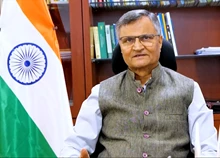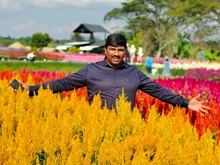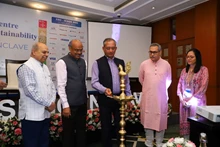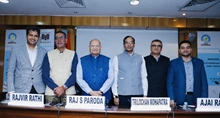
Indian Society of Soil Salinity and Water Quality, in collaboration with ICAR-CSSRI (Central Soil Salinity Research Institute), Karnal, and the Indian Council of Agricultural Research, is organizing the International Salinity Conference on 'Rejuvenating Salt Affected Ecologies for Land Degradation Neutrality under Changing Climate' in Karnal, Haryana, from February 14-16, 2024. The conference aims to facilitate discussions and deliberations on innovative strategies under various sub-themes, inviting researchers, development officials, farmers, industries, NGOs/FPOs, planners, and policymakers to share their experiences and insights on sustainable soil salinity management and the use of poor-quality water.
Addressing the Global Challenge of Salt-Affected Soils
With a total coverage of approximately 835 million hectares (Mha), comprising both sodic and saline soils, the impact on livelihoods is profound. Of this area, approximately 76 Mha is a result of human-induced salinization and sodification, posing a threat to the livelihoods of over 2.6 billion resource-poor peasants. The economic toll of this degradation amounts to an annual loss of around US$ 6.3 billion. Urgent action is needed to stem further deterioration, highlighting the importance of sustainable land management for ecological stability and meeting Sustainable Development Goals (SDGs).
Situation of Soil Salinity in India
India, too, grapples with the challenge of salt-affected soils, with 6.73 Mha of land affected, including 2.95 Mha of saline land spread across 16 states. Projections suggest that this figure could rise dramatically to 16.2 Mha by 2050. The causes are varied, including inefficient drainage systems, waterlogging, unsustainable management practices, and extensive use of poor-quality groundwater for irrigation.
The latter, ranging from 32% to 84% in different regions, poses a serious threat to crop production sustainability. States such as Uttar Pradesh, Gujarat, Maharashtra, Tamil Nadu, Haryana, and Punjab are particularly affected, with approximately 80% of India's sodic lands concentrated in these areas. Gujarat alone accounts for 1.68 Mha of saline soils.
The annual crop production loss due to salinity and sodicity is estimated at 16.84 million tonnes, equating to a loss of Rs 23,00 million (2015 base price), underscoring the urgency of sustainable land management practices to safeguard food security.
International Efforts and India's Commitment
Recognizing the global significance of soil salinization, the United Nations Convention to Combat Desertification (UNCCD) has developed a comprehensive strategic framework (2018-2030) to address various forms of land degradation, including soil salinization, erosion, desertification, and droughts. The aim is to achieve land degradation neutrality (LDN) by 2030, restoring land productivity and improving the livelihood security of farmers. In line with these efforts, India has set a target to restore 26 Mha of degraded land, including salt-affected and waterlogged areas, by 2030.
Towards Sustainable Solutions: ICAR-CSSRI's International Salinity Conference
To achieve India's LDN targets, particularly in areas affected by salinity and sodicity, a holistic approach is required. This includes the development of cost-effective, scalable technological solutions, institutional collaborations, financial support, and an enabling policy environment aligned with national priorities. The early bird registration deadline is February 8, while the final deadline for conference registration is February 14 2024.
Themes of the International Salinity Conference
-
Theme I: Assessment, monitoring and mapping of salinity and degraded lands using advanced GIS and remote sensing tools, drivers and indicators
-
Theme II: Processes of salinization/land degradation and their effects on soil, water, crops, and amelioration strategies to achieve LND and SDGs.
-
Theme III: Efficient and sustainable strategies for productive use of groundwater and low-quality water in agriculture
-
Theme IV: Approaches to develop multi-stress tolerance in crops for sustainable management of saline ecologies
-
Theme V: Alternate land use, agro-forestry, horticultural, integrated farming systems and crop diversification for improving the productivity of degraded and saline agro-ecosystems
-
Theme VI: Adaptation and mitigation options and climate-resilient practices for nutrition, food and livelihood security in salt-affected ecosystems.
-
Theme VII: Impact of salinity/NRM technologies, socio-economic issues, policies/institutions, and crop-livestock linkages for sustainable production in salt-affected ecosystems.
Addressing the challenge of salt-affected soils is crucial for global food security and environmental sustainability. With concerted efforts at the international and national levels, coupled with innovative strategies and collaborative initiatives, it is possible to mitigate the adverse effects of soil salinization and ensure a more resilient agricultural future.











